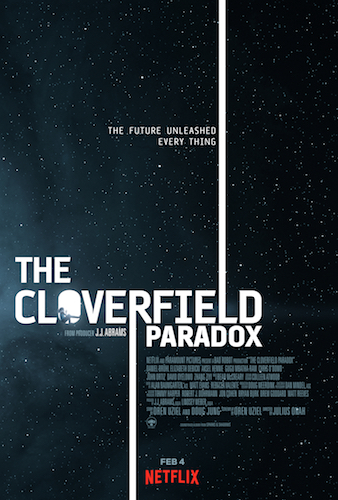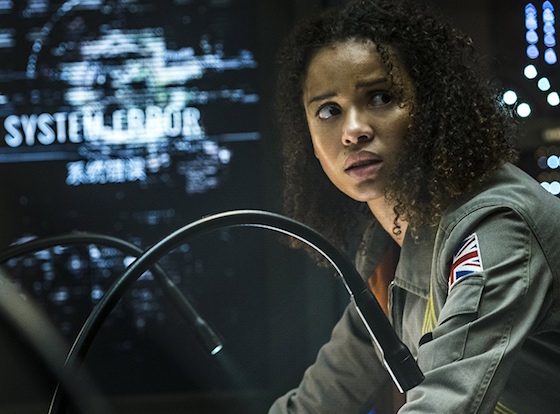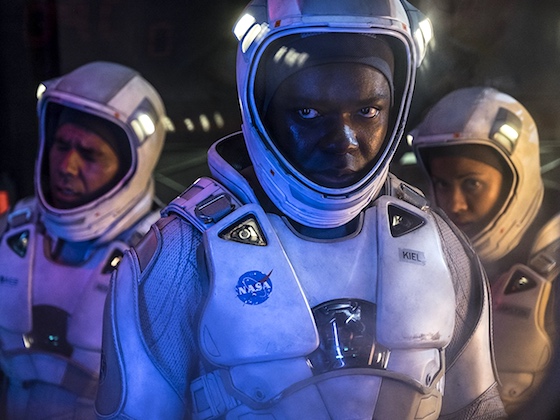Julius Onah | 102 mins | streaming (HD) | 2.39:1 | USA / English & Chinese

“Logic doesn’t apply to any of this.”
So says Tam, played by Zhang Ziyi, about halfway through this third movie in the Cloverfield sort-of-series. She’s talking about the crazy circumstances they’ve found themselves mixed up in, but she may as well be talking about the movie itself.
Set in the near future, the energy crisis has reached a point where it threatens the continued existence of mankind as we know it. Our last hope is an experimental particle accelerator that could provide all the energy we need, but it’s so potentially dangerous that it’s being tested in space. After almost two years of failed attempts the accelerator finally works… until it fails spectacularly, crippling the station. When the systems come back online, the crew realise they’ve lost something: the Earth. And that’s just the start of the crazy shit that’s gonna go down.

The Cloverfield Paradox started life as a spec script titled God Particle, which was at some point Cloverfieldised by J.J. Abrams’ production company, Bad Robot. The writer who originated the project, Oren Uziel, has said that “sometimes [sci-fi] movies tend to be more concerned with whatever the obstacle is, and I’m more concerned with the characters’ relationships to each other and that obstacle I guess. So to me, when you say it’s a contained astronaut movie, I’m just curious what those astronauts are going through and what they’re experiencing and what the character story is, and what specifically the threat is is often less of a concern to me.” Oh boy, is that apparent in the finished film. Whatever else Abrams & co changed to make this a Cloverfield film (and I’ll get to that later), I guess it’s Uziel’s original work that’s responsible for the half-arsed, inconsistent, and poorly-explained threats that the astronauts must face. No spoilers, but the explanation for what’s going on (which is so obvious that I don’t think even the film itself tried to play it as a twist in the end) doesn’t even vaguely begin to explain some of the random shit that happens. Uziel just throws sci-fi or horror ideas at the screen one after the other, with no care for if it hangs together consistently. Consequently, it doesn’t.
Unfortunately, his alleged interest in character hasn’t resulted in anything worthwhile either. At best they’re broadly defined archetypes — the Funny One; the Noble Captain; the One With A Tragedy In Her Past That We’ll Eventually Learn And It Will Affect Her Decisions; etc. At worst they’re utterly blank, with little or no time devoted to establishing or developing them. There’s a strong cast of good actors — people like Gugu Mbatha-Raw (who gets the best of a poor lot), David Oyelowo, Daniel Brühl, Elizabeth Debicki, Chris O’Dowd (who at least gets to be funny) — but they’re left to battle bravely against the mediocrity, and often terrible dialogue that comes with it, as they attempt to instil any kind of personality into their roles. They’re fighting a losing battle.

Suffering most of all is Roger Davies as Michael, who’s the star of his own subplot back on Earth. Davies is probably aware this is his big break (his previous roles are mainly in things like Sky’s football soap Dream Team and Channel 5’s attempt at a soap, Family Affairs), but he’s lumbered with some of the clunkiest material of all. He struggles gamely to make Michael seem like a plausible human being while delivering first-draft-level dialogue, but I don’t think even Daniel Day-Lewis could make this material work. An item of trivia on IMDb (source uncited, as usual) claims that all the Michael stuff was added later (in reshoots, I presume) to strengthen the film’s Cloverfield connection. It feels like that too: his stuff is completely divorced from the main thrust of the story aboard the space station, and it looks like it’s been achieved on as few sets with as few additional characters as possible.
Indeed, almost everything that’s explicitly Cloverfield-y smacks of reshoots. There’s a newscast about the eponymous “Cloverfield Paradox” that’s all inserts, i.e. it’s on a screen with none of the main cast also in shot. The main characters do refer to the paradox later on, but I’m pretty sure they only ever called it “the paradox”. (Also, side note, I’m not sure anyone involved in the making of this film knows what a paradox actually is.) The space station is actually called “Cloverfield”, but that’s mainly (only?) seen on CG exterior shots and green-screened monitors. Perhaps I’m forgetting something — perhaps there was a Cloverfield reference or two in the main body of the movie — but the vast majority of them could just have been shoved in during post-production. And if they weren’t, they feel like they were.

I enjoyed the original Cloverfield and I liked the idea of them creating a franchise that was Twilight Zone-esque — movies connected by theme and style rather than plot. It seemed like a good way of getting original sci-fi movies made at a time when Hollywood only wants franchises. But we’re two sequels in now, and they were both marred by the Cloverfield elements forced upon them. And whereas 10 Cloverfield Lane was a very good movie before its tacked-on finale, The Cloverfield Paradox is pretty terrible throughout. We’re on a downward curve.
What was once set to be the expensive big-screen older brother to Black Mirror is now cast in its shadow: they’re both debuting on Netflix, but while Charlie Brooker’s TV series benefits from months of enormous anticipation and glowing reviews, Cloverfield was dumped just a couple of hours after its first trailer premiered, presumably in the hope you’d watch it before the reviews rolled in. When you combine that with the fact it was meant to be a theatrical release but Paramount ended up flogging it to Netflix as one of their “originals”, you have to think that even the studios knew it was a dud.

The Cloverfield Paradox featured on my list of The Five Worst Films I Saw For the First Time in 2018.

An excellent way to start your review. I expect and want a movie like this to take some chances but there was just so much unexplained and more importantly UNEXPLAINABLE. Just craziness. But then it goes out of its way to explain some things that were better left unsaid. Terrible combination.
LikeLiked by 1 person
It’s a real mess, isn’t it? I don’t know why anyone involved thought the screenplay was filmable like that.
LikeLike